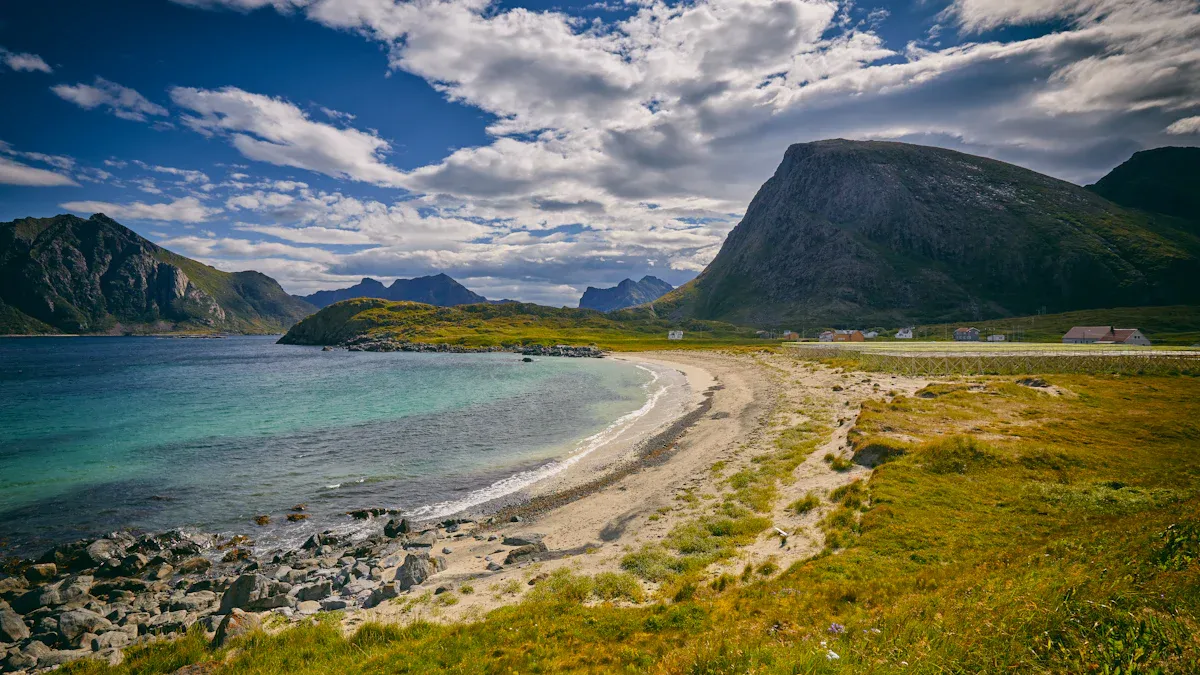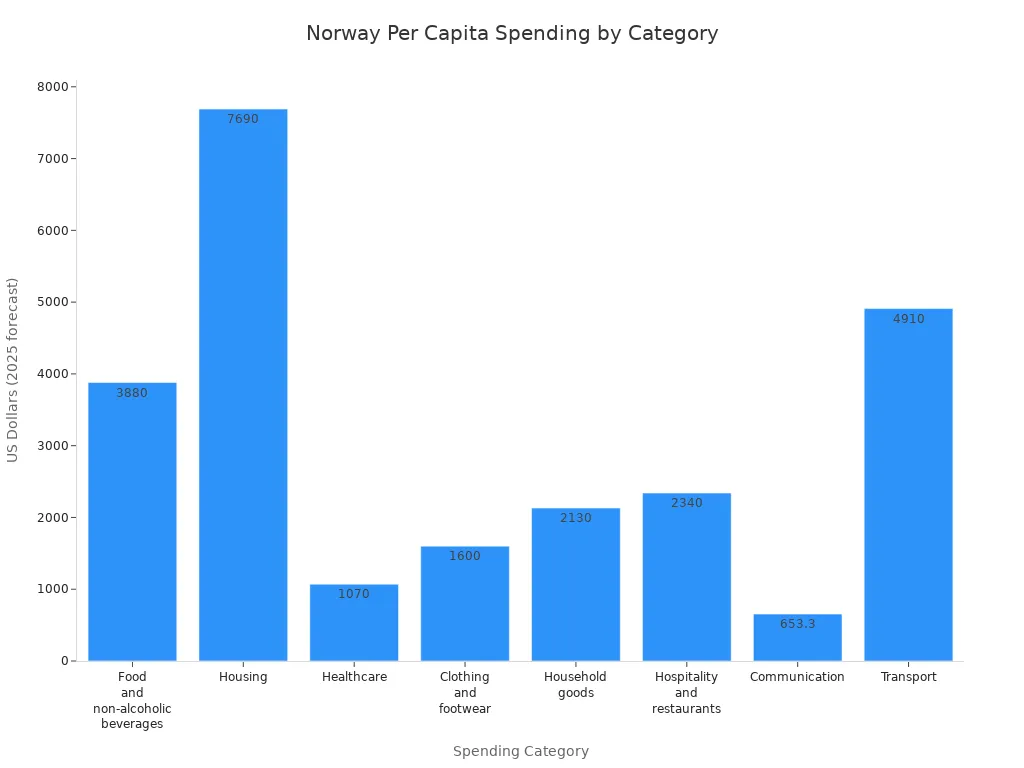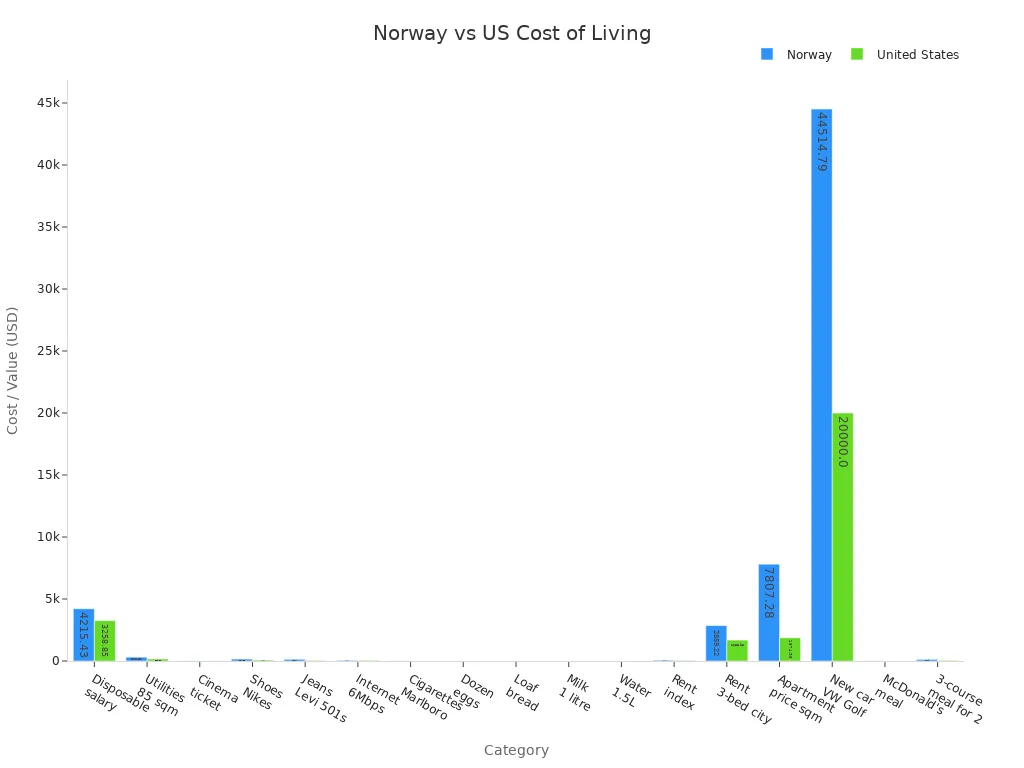- EasyCard
- Trade
- Help
- Announcement
- Academy
- SWIFT Code
- Iban Number
- Referral
- Customer Service
- Blog
- Creator
Is Living in Norway Right for You A Balanced Perspective

Image Source: pexels
Living in Norway is not a one-size-fits-all choice. Imagine waking up to snowy mountains or bright summer nights—does that sound exciting or overwhelming? You might love the quiet pace of life in Norway, or you could crave more action. Maybe you value safety and clean surroundings, or perhaps you worry about the cost. Living in Norway means thinking about what matters most to you. As you read, ask yourself if life in Norway fits your dreams and needs.
Key Takeaways
- Norway offers a high standard of living with good pay, job security, and excellent healthcare that covers everyone.
- The country has stunning nature and clean cities, encouraging outdoor activities and a healthy lifestyle.
- Living costs in Norway are high, especially for housing and daily essentials, so careful financial planning is important.
- Long, dark winters and a quiet lifestyle may be challenging if you prefer warm weather or busy social scenes.
- Success in Norway comes from being adaptable, learning the language, and embracing local culture and nature.
Benefits

Image Source: unsplash
High Standard of Living
You might wonder what makes the high standard of living in Norway stand out. If you compare Norway to other European countries, you will see that it ranks among the top for income and quality of life. People in Norway enjoy high pay, with an average annual wage of $74,864 USD. Even though things like rent and groceries can cost more, most people find that their strong purchasing power helps them afford a comfortable lifestyle.
Here’s a quick look at how Norway stacks up against the rest of Europe:
| Indicator | Norway (per capita) | EU Average (per capita) | Additional Notes |
|---|---|---|---|
| GDP per capita (2023) | $87,497.33 USD | $35,918.18 USD | Norway ranks 7th globally by purchasing power parity. |
| Average monthly income | $8,598 USD | N/A | Higher than the USA’s $6,726 USD; cost of daily necessities is 10.6% lower than in the USA. |
| Income tax (average) | 17.8% (married couple with 2 children) | N/A | Total tax burden 23.6%, top rate 38.4%; relatively high compared to other OECD countries. |
| Inflation (2024) | 3.3% | 2.6% | Slightly above EU average. |
| Corruption Perception | 81 (index) | N/A | Above global average, indicating low corruption. |
You will notice that Norway’s high standard of living comes from more than just money. The country’s economic policies help keep jobs stable and wages fair. Most workers are covered by collective wage agreements, which means you can expect job security and good working conditions.
If you look at how people spend their money, you will see that Norwegians can afford a wide range of goods and services. Here’s a chart showing average spending by category:

You will find that living in Norway gives you access to a high standard of living, but you should also weigh the pros and cons, especially if you are used to lower prices elsewhere.
Stunning Natural Scenery
If you love the outdoors, you will find Norway’s stunning natural scenery hard to beat. About 17.8% of the land is protected as national parks or nature reserves. This means you can explore wild forests, dramatic fjords, and snow-capped mountains almost everywhere you go.
Some of the most popular natural attractions include:
- Vøringsfossen, the most visited waterfall in Norway
- Trollstigen, a famous mountain road with breathtaking views
- Geirangerfjord and Nærøyfjord, both UNESCO World Heritage Sites
- The Northern Lights and midnight sun in Northern Norway
You can hike, ski, kayak, or just enjoy the scenery. Every year, hundreds of thousands of tourists visit these places, but as a resident, you get to enjoy them whenever you want. The scenery is not just beautiful—it shapes the lifestyle in Norway, encouraging you to spend time outside and appreciate nature’s peace.
Norway’s stunning natural scenery is more than a backdrop—it’s a way of life. You might find that being surrounded by such beauty helps you slow down and enjoy each day.
Clean Cities and Environment
When you walk through Oslo or any other Norwegian city, you will notice how clean everything looks. Norway’s cities rank among the cleanest in Europe for both air and water quality. The air in Oslo often meets the World Health Organization’s strictest guidelines for pollution. About 90% of people have access to high-quality treated drinking water.
Norwegian cities stay clean because of smart policies and technology:
- Solar-powered trash bins keep streets tidy and reduce noise from garbage trucks.
- Electric buses and ferries cut down on pollution.
- Strict rules and public campaigns encourage everyone to keep the environment clean.
- Green parks and well-kept public spaces make cities more pleasant.
You will see that Norwegians take pride in their cities. This pride shows in the way people care for public spaces and follow rules about recycling and waste. If you value a clean environment, you will find this one of the biggest pros of living in Norway.
Safety and Security
You might feel safer in Norway than almost anywhere else. Surveys show that people in Oslo and other cities rate their neighborhoods very highly for safety, with scores close to 9 out of 10. Low crime is a real part of daily life. Most people feel comfortable walking outside at night or letting their kids play in parks.
Even after rare events like the 2011 Oslo attacks, most Norwegians continued to feel safe. The sense of security helps you relax and enjoy your surroundings. It also encourages you to be more active outdoors, which is a big part of the Norwegian lifestyle.
Universal Healthcare
One of the biggest pros of living in Norway is universal healthcare. Every resident, including you if you move there, gets access to healthcare services. The system covers 100% of the population. You do not have to worry about huge medical bills or being left out if you get sick.
Norway’s healthcare system ranks among the best in the world:
- 4th globally for quality of care
- 2nd for patient-centered care
- Modern hospitals in Oslo, Trondheim, and Bergen
- Strong results in treating preventable diseases
You will find that universal healthcare gives you peace of mind. You can focus on your work, family, and lifestyle without worrying about medical costs. This is a key reason many people see Norway’s healthcare as a major advantage.
Family Life in Norway
If you are thinking about raising kids in Norway, you will discover some of the world’s most family-friendly policies. Parents get up to 49 weeks of paid leave at full salary, or 59 weeks at 80% pay. Both mothers and fathers have dedicated time off, which helps families share childcare and support gender equality.
Kindergarten is a right for all children over one year old, and the government helps pay for childcare. These policies make it easier for both parents to work and spend time with their kids. Studies show that children in Norway benefit from better health, higher vaccination rates, and stronger family bonds.
Norway’s approach to family life is one of its biggest pros. You will find support for both parents and children, making it easier to balance work and home.
Norwegian families often enjoy a good work-life balance. While there are differences between families, most people find that flexible hours and strong social support help them spend more time together. This is a big part of the Norwegian lifestyle and one of the reasons many people choose to move here.
Drawbacks
Cost of Living
You might have heard that the cost of living in Norway is high. This is true, and it can be one of the biggest cons for many people thinking about living in Norway. Everyday expenses like rent, groceries, and services often cost much more than in other countries, especially the United States.
Take a look at how the cost of living in Norway compares to the US:
| Category | Norway Cost / Value | Comparison to US (Difference) | US Cost / Value |
|---|---|---|---|
| Average monthly disposable salary (after tax) | $4,215.43 | 29% more | $3,258.85 |
| Basic utilities (85 sqm apartment) | $308.82 | 91% more | $162.08 |
| Cinema ticket | $18.14 | 81% more | $10.00 |
| Shoes (Nikes) | $157.28 | 2 times more | $76.09 |
| Jeans (Levi 501s) | $139.06 | 3 times more | $40.58 |
| Internet (broadband) | $53.31 | 17% more | $45.72 |
| Dozen eggs | $5.11 | 2 times more | $2.23 |
| Loaf of bread | $3.96 | 67% more | $2.37 |
| Milk (1 litre) | $2.40 | 2 times more | $0.99 |
| Rent index | 62.73 | 68% more | 37.45 |
| Rent, 3-bedroom (city centre) | $2,859.22 | 70% more | $1,685.98 |
| Apartment price per sqm | $7,807.28 | 4 times more | $1,874.98 |
| McDonald’s meal | $15.66 | 3 times more | $6.00 |
| 3-course meal for 2 | $131.90 | 3 times more | $45.00 |

If you plan to live in Oslo, you will notice that rent and groceries take up a big part of your budget. For example, the average rent for a one-bedroom apartment in Oslo is about $1,168 per month. Groceries like milk, bread, and eggs also cost more than in many other places. Even a simple meal at McDonald’s can cost three times as much as in the US.
The high cost of living in Norway means you need to plan your finances carefully. While salaries are higher, your money does not always go as far as you might expect. Many expats find this one of the main cons of living in Norway, especially if they are used to lower prices elsewhere.
Weather and Daylight
The weather in Norway can be a shock if you come from a warmer or sunnier place. Winters are long and cold, with short days and little sunlight. In Oslo, you get about 6 to 7 hours of daylight in December and January. In the summer, you can enjoy up to 18 or 19 hours of daylight, but the change can feel extreme.
| Season | Representative Months | Average Daylight Hours |
|---|---|---|
| Winter | December, January | 6 to 7 hours |
| Summer | June, July | 18 to 19 hours |
If you move farther north, you might experience the polar night, where the sun does not rise for weeks. This can make you feel tired or even sad. Many people struggle with the darkness and cold, which is a real con of living in Norway.
Norwegians have some clever ways to cope with the dark and cold:
- They say, “There is no such thing as bad weather, only bad clothing.” You will see people wearing warm, waterproof clothes so they can enjoy the outdoors all year.
- During winter, many people turn off harsh lights and use lamps and candles to make their homes feel cozy. This is called “koselig.”
- People try to keep a positive mindset about winter and look for ways to enjoy it, like skiing or meeting friends for coffee.
Still, the weather and daylight can be tough to handle, especially if you are not used to it. This is one of the cons you should think about before moving.
Social Integration
Making friends and feeling at home in Norway can take time. Many expats say that Norwegians are friendly but reserved. It is not easy to break into social circles, and you might feel lonely at first. In fact, 51% of expats in Norway say they have trouble making local friends, which is much higher than the global average of 36%.
You may also notice that joining clubs or volunteer groups is important for meeting people. However, immigrants often join these groups less than Norwegians do. This makes it harder to feel included. The government now expects newcomers to learn the language and culture, which can feel like a lot of pressure.
| Challenge Category | Description |
|---|---|
| Economic Independence & Employment | Immigrants have higher unemployment and lower job rates than Norwegians. |
| Social Participation | Immigrants join fewer clubs and volunteer groups, making it harder to meet people. |
| Integration Policy Shift | New laws expect you to learn Norwegian and take part in society. |
| Multifaceted Integration | You need to find work, learn the language, and respect local values to fit in. |
If you are an expat, you might find social integration one of the biggest cons of living in Norway. It takes patience and effort to build a social life, but it is possible if you stay open and get involved.
Job Market Challenges
Finding a job in Norway can be hard, especially if you do not speak Norwegian. The job market is competitive, and many employers want you to know the language. This is a big con for expats who hope to work in their field right away.
Some industries do hire people who speak only English. These include:
- Oil and gas (especially for engineers and specialists)
- University research jobs
- Shipping
- IT and tech companies in big cities like Oslo, Stavanger, and Bergen
If you have special skills or work in an international company, you have a better chance. Still, learning Norwegian will help you a lot. Many expats find that job hunting is one of the hardest parts of living in Norway.
Quiet Lifestyle
Life in Norway moves at a slower pace, especially outside big cities like Oslo. Many people enjoy the peace and quiet, but you might find it too calm if you like busy nightlife or lots of social events. Smaller towns and suburbs have less noise, less crime, and more space, which is great for families but can feel lonely for some.
Residents often say that the quiet lifestyle is good for raising children and enjoying nature. However, if you are an expat who loves action and excitement, this can be a con. You may need to adjust your expectations and find new ways to have fun.
Tip: If you value a lively social scene, you might want to live in Oslo or another large city. Smaller towns offer a different kind of lifestyle, with more focus on family and nature.
When you look at the pros and cons of living in Norway, remember that the quiet lifestyle, high cost of living, and social integration challenges are just as important as the benefits. Think about what matters most to you before making a decision.
Who Thrives
Adaptable Personalities
You will thrive in Norway if you can adapt to new situations and enjoy learning about different ways of life. People who do well here value independence and take personal responsibility for their actions. You will notice that Norwegians treat everyone as equals, no matter their gender, age, or background. If you respect modesty and avoid bragging, you will fit right in. Honesty and politeness matter a lot, and people appreciate direct communication. You might find that Norwegians seem reserved at first, but with patience and openness, you can build strong friendships.
Here are some traits that help you succeed in Norwegian culture:
- You value equality and treat others with respect.
- You show humility and avoid standing out too much.
- You respect personal boundaries and give people space.
- You join community activities and take part in dugnad, which means volunteering to help your neighborhood.
- You stay resilient, even when the weather or social life feels tough.
Nature Lovers
If you love the outdoors, Norway could be the best place to live in norway for you. Almost everyone in Norway enjoys outdoor activities. A recent survey showed that 98.8% of young people take part in friluftsliv, which means spending time in nature. You can hike, ski, or just relax by a lake. Oslo offers easy access to forests and fjords, so you never run out of places to explore. The culture encourages you to get outside, even in winter. If you care about the environment and want to live in a country that values sustainability, you will feel at home.
Families and Children
Families with children often find Norway welcoming and supportive. The country offers world-leading education and childcare. Every child has a guaranteed spot in kindergarten after age one, and the government keeps tuition affordable. You get discounts if you have more than one child, and the third child can attend for free. The system supports children with disabilities and focuses on equality, respect, and joy. Most children attend high-quality care centers, and the government covers most of the costs. You will also find world-leading education in public schools, which helps your children thrive. Oslo and other cities offer many family-friendly parks and activities, making life easier for parents and kids.
Who May Struggle
Not everyone finds it easy to adjust to life in Norway. Some expats struggle with the high cost of living and taxes. Winters can feel long and dark, especially if you move to Oslo or farther north. Making friends takes time because Norwegians value personal space and may seem distant at first. Everyday life can feel serious, with fewer social events and a different sense of humor. Some expats experience prejudice or feel unwelcome, especially if they come from different backgrounds. If you expect a lively social scene or quick friendships, you might find it hard to settle in, even though english is widely spoken and there is an open and inclusive culture in many places. Still, with patience and a willingness to join in, you can find your place in Norwegian culture and enjoy the open and inclusive culture that makes Norway unique.
Moving to Norway

Image Source: unsplash
Work Permits
If you plan on moving to Norway for work, you need to secure a work permit before you arrive. The process starts with a job offer from a Norwegian employer. You must have the right education or training for the job. Your salary should match or exceed the average wage in Norway. Here’s what you need to do:
- Get a full-time job offer that matches your skills.
- Make sure your salary meets Norwegian standards.
- Gather documents: valid passport, job contract, proof of qualifications, police clearance, and accommodation details.
- Submit your application, either in person or through your employer.
- Translate all documents into English or Norwegian if needed.
- Register with the National Population Register when you arrive. This step gives you access to healthcare and tax services.
You also need to register with the local police within seven days of arriving in Oslo or any other city. This step helps you get your residence card and start your new life.
Housing Options
Finding accommodation is one of the first things you’ll do after moving to Norway. You can choose from several types of high quality homes:
- Apartments (studio, basement, or multi-bedroom)
- Detached houses
- Semi-detached houses
- House shares
In Oslo, you’ll notice that rental prices are higher than in smaller towns. A one-bedroom apartment usually costs between $1,500 and $2,000 USD per month. If you need more space, a two-bedroom apartment can range from $2,000 to $2,500 USD per month. Many newcomers start with a house share to save money and meet people. Quality housing is available, but you should act fast because demand is high. Always check the condition of the property and make sure your accommodation meets your needs.
Practical Tips
Moving to Norway can feel overwhelming, but a few tips can make your transition smoother:
- Pick your city based on your job and lifestyle. Oslo offers the most jobs and a lively city life. Bergen is perfect for nature lovers. Stavanger is great for energy jobs. Trondheim suits students and tech workers. Tromsø is ideal if you love winter and research.
- Apply for the right work permit before you move. Americans must have a permit to work legally.
- Register for a personnummer and join the National Insurance Scheme to access healthcare.
- Learn Norwegian. Most jobs require it, and many job ads are only in Norwegian.
- Prepare for high living costs. You’ll need extra money for accommodation deposits and daily expenses.
- Understand the healthcare system. Public healthcare is good and cheaper than in the US, but private insurance helps at first.
- If you have kids, look at school options. Public schools teach in Norwegian, while international schools charge tuition.
- Get used to digital payments. Most people in Oslo and other cities use cards or apps.
- Be ready for a competitive job market and language barriers.
- Adjust to the climate and lifestyle. Winters are long, and the culture values work-life balance and volunteering.
Tip: Take time to learn about Norwegian customs. Joining local activities helps you settle in and enjoy your new home.
Life in Norway: Pros and Cons Table
When you think about life in norway, it helps to see the big picture. Sometimes, a simple table makes things clear. You can quickly spot what you might love and what could be tough. Here’s a handy table to help you weigh the pros and cons of living in norway:
| Pros | Cons |
|---|---|
| High standard of living | High cost of living |
| Beautiful natural scenery | Long, dark winters |
| Clean cities and environment | Challenging job market for foreigners |
| Low crime and safe communities | Harder to make friends at first |
| Universal healthcare | Quiet lifestyle may feel lonely |
| Family-friendly policies | Need to learn Norwegian |
| Great work-life balance | Expensive housing in cities |
Tip: Use this table as a quick guide when you think about life in norway. Ask yourself which pros matter most to you. Which cons would be hardest for you to handle?
You might notice that life in norway offers many benefits, like safety and beautiful nature. You also see some real challenges, such as the high cost of living and the long winters. If you want a peaceful place with strong social support, you may find life in norway rewarding. If you need lots of excitement or warm weather, you might struggle. The pros and cons of living in norway depend on what you value most.
Living in norway offers you safety, beautiful nature, and strong support for families. You might also face high costs, cold winters, and a quiet lifestyle. Think about what matters most to you. Try talking with expats, reading about different regions, or even planning a visit. Ask yourself if living in norway matches your dreams and needs. The right choice is always personal.
FAQ
What is the best way to find a job in Norway?
You should start by searching on Norwegian job sites like Finn.no or NAV. Networking helps a lot. Many jobs require you to speak Norwegian, so learning the language gives you an advantage.
Do I need to speak Norwegian to live in Norway?
You can get by with English in big cities, but most jobs and daily life use Norwegian. If you want to make friends and feel at home, learning Norwegian makes things much easier.
How much money should I save before moving to Norway?
You should save at least $5,000–$10,000 USD for your first few months. This covers rent, deposits, and daily expenses. Norway’s high cost of living means you need a solid financial cushion.
Is healthcare really free in Norway?
Healthcare is not completely free. You pay a small fee for doctor visits and prescriptions, but the government covers most costs. Once you reach an annual limit (about $300 USD), further care is free for the rest of the year.
*This article is provided for general information purposes and does not constitute legal, tax or other professional advice from BiyaPay or its subsidiaries and its affiliates, and it is not intended as a substitute for obtaining advice from a financial advisor or any other professional.
We make no representations, warranties or warranties, express or implied, as to the accuracy, completeness or timeliness of the contents of this publication.




Contact Us
Company and Team
BiyaPay Products
Customer Services
is a broker-dealer registered with the U.S. Securities and Exchange Commission (SEC) (No.: 802-127417), member of the Financial Industry Regulatory Authority (FINRA) (CRD: 325027), member of the Securities Investor Protection Corporation (SIPC), and regulated by FINRA and SEC.
registered with the US Financial Crimes Enforcement Network (FinCEN), as a Money Services Business (MSB), registration number: 31000218637349, and regulated by FinCEN.
registered as Financial Service Provider (FSP number: FSP1007221) in New Zealand, and is a member of the Financial Dispute Resolution Scheme, a New Zealand independent dispute resolution service provider.


















